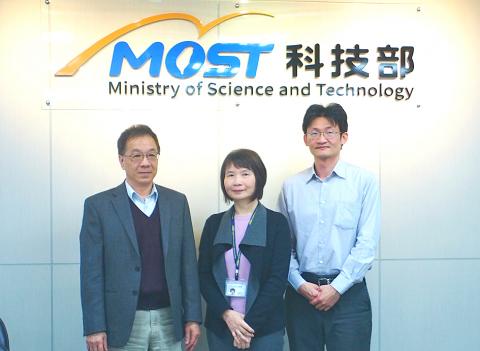Although the number of people in Taiwan who identify as Taiwanese has fallen since its peak of 75.15 percent in 2015, it has remained steady at 60 to 70 percent, the Ministry of Science and Technology yesterday told a news conference announcing the results of its Social Change Survey, which has been conducted for more than three decades.
In 1995, 32.13 percent of people in Taiwan identified as Taiwanese, Academia Sinica Institute of Sociology research fellow Lin Thung-hong (林宗弘) said.
It has since skyrocketed 43 percentage points and in 2015 topped 75 percent, he said.

Photo: Chien Hui-ju, Taipei Times
Although the theme of the survey varies from year to year, questions on important topics such as national identity are almost always included, he said.
The questionnaire asked participants whether they identified as “Taiwanese, “both Taiwanese and Chinese,” “both Chinese and Taiwanese” or “Chinese,” Lin said.
In 1992, when the question was first included, more than half of respondents said they have a dual national identity, but by 2015, the proportion had fallen to about 23 percent, he said.
For this year’s questionnaire, the researchers included questions about emerging technologies and the risks they pose, including views toward artificial intelligence, online information security, fake news and nuclear energy, he said.
The findings could also be applied to policymaking, researchers said.
For example, in 2017, 48.39 percent of men who earned less than NT$30,000 per month were unmarried — the highest ever, Lin said.
This year, the government raised the minimum monthly wage to NT$23,100, he said, adding that if employment conditions for young workers continue to improve, the marriage and fertility rates would rise.
The survey was begun by the ministry — which was then called the National Science Council — in 1984.
Topics have included family, education, social stratification, social mobility, political culture, communication, culture and value judgements, religion, interpersonal relations and social networks, institute research fellow and project leader Fu Yang-chih (傅仰止) said.
The survey has collected more than 125,000 responses over 34 years, researchers said.
It has been called one of the world’s largest surveys of its kind, its Web site said.
Taiwanese researchers have also participated in international collaborations to compare results from the survey with those from more than 30 other nations, Fu said.

Conflict with Taiwan could leave China with “massive economic disruption, catastrophic military losses, significant social unrest, and devastating sanctions,” a US think tank said in a report released on Monday. The German Marshall Fund released a report titled If China Attacks Taiwan: The Consequences for China of “Minor Conflict” and “Major War” Scenarios. The report details the “massive” economic, military, social and international costs to China in the event of a minor conflict or major war with Taiwan, estimating that the Chinese People’s Liberation Army (PLA) could sustain losses of more than half of its active-duty ground forces, including 100,000 troops. Understanding Chinese

The Ministry of Foreign Affairs (MOFA) yesterday said it is closely monitoring developments in Venezuela, and would continue to cooperate with democratic allies and work together for regional and global security, stability, and prosperity. The remarks came after the US on Saturday launched a series of airstrikes in Venezuela and kidnapped Venezuelan President Nicolas Maduro, who was later flown to New York along with his wife. The pair face US charges related to drug trafficking and alleged cooperation with gangs designated as terrorist organizations. Maduro has denied the allegations. The ministry said that it is closely monitoring the political and economic situation

‘SLICING METHOD’: In the event of a blockade, the China Coast Guard would intercept Taiwanese ships while its navy would seek to deter foreign intervention China’s military drills around Taiwan this week signaled potential strategies to cut the nation off from energy supplies and foreign military assistance, a US think tank report said. The Chinese People’s Liberation Army (PLA) conducted what it called “Justice Mission 2025” exercises from Monday to Tuesday in five maritime zones and airspace around Taiwan, calling them a warning to “Taiwanese independence” forces. In a report released on Wednesday, the Institute for the Study of War said the exercises effectively simulated blocking shipping routes to major port cities, including Kaohsiung, Keelung and Hualien. Taiwan would be highly vulnerable under such a blockade, because it

UNRELENTING: China attempted cyberattacks on Taiwan’s critical infrastructure 2.63 million times per day last year, up from 1.23 million in 2023, the NSB said China’s cyberarmy has long engaged in cyberattacks against Taiwan’s critical infrastructure, employing diverse and evolving tactics, the National Security Bureau (NSB) said yesterday, adding that cyberattacks on critical energy infrastructure last year increased 10-fold compared with the previous year. The NSB yesterday released a report titled Analysis on China’s Cyber Threats to Taiwan’s Critical Infrastructure in 2025, outlining the number of cyberattacks, major tactics and hacker groups. Taiwan’s national intelligence community identified a large number of cybersecurity incidents last year, the bureau said in a statement. China’s cyberarmy last year launched an average of 2.63 million intrusion attempts per day targeting Taiwan’s critical